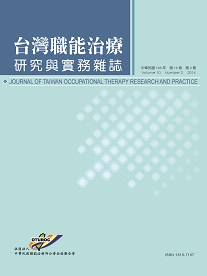Journal of Taiwan Occupational Therapy Research and Practice

半年刊,正常發行
研究目的:本研究是探討園藝活動對社區老人身心健康之成效。方法:單一組前後測實驗方式,以立意取樣方式在社區據點收案,排除失智認知障礙長者,共 65 名參與社區關懷據點長者接受 6 週園藝活動團體。在活動前後進行前後測,前後測驗包含簡易智能量表 (MMSE) 及畫鐘測驗 (CDT) 來評估認知功能;身體健康調查簡表 (SF-36),老人憂鬱量表 (GDS-15) 來評量老人憂鬱狀況;園藝治療福祉效益量表來評量對於老人園藝活動效益。統計方式以配對 t 檢定來分析園藝活動後身心健康改善狀況。結果:在配對 t 檢定發現社區老人在簡易智能量表 (MMSE, p < .001)、畫時鐘測驗 (CDT-D, p < .05)、仿繪鐘 (CDT-C, p < .01) 有顯著改善,認知功能在園藝活動介入後有改善;身體健康調查簡表 (SF-36) 中一般健康狀況 (p < .001) 顯著改善;園藝治療福祉效益量表中僅有園藝栽培技術 (p < .01)有顯著進步,但在其它福祉效益 (如:成就感、社交技巧)無明顯改善。在老人憂鬱量表 (GDS-15, p = .931) 並無顯著差異,代表受試者並無明顯憂鬱狀況。結論:透過園藝活動,有效改善社區長者的認知及一般健康。
Purpose: The purpose of this study was to investigate the effectiveness of using horticultural activities to improve physical and mental health for the elderly in community. Method: A pre-post study design was used to evaluate the effects of 6-weekly horticultural activities for the elderly in community care centers, excluding dementia and cognitive impairment. 65 Participants trained with regular community group activities along with additional 6-week horticultural activities. All participants were assessed before and after 6-week horticultural activities using the mini-mental state examination (MMSE) , the clock drawing test (CDT) , 36-item short-form health survey(SF-36), geriatric depression scale (GDS-15) , and horticultural therapy well-being scale. The data were analyzed by paired t-test. Results: The paired t-test results showed the MMSE (p < .001), the clock drawing part (CDT-D, p < .5) and the clock coping part (CTD-C, p < .01) were significantly different between pre- and post-intervention. The 65 elderly in community significantly improved in cognitive function. The general health within SF-36 showed significantly different (p < .001). The gardening techniques which were assessed in horticultural therapy well-being scale (p < .01) significantly improved in the elderly while the other items of well-being (e.g., accomplishment, social skills) didn’t show significant improvement. The GDS-15 also had no significant change in elderly, and the participants have no obvious depression. Conclusion: Occupational therapist through horticultural activities effectively improves cognitive function and general health for elderly in community.












